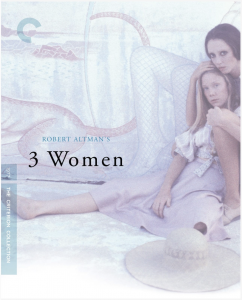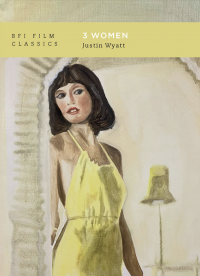



Both the British Film Institute and the Criterion Collection have issued major statements on Robert Altman's dream film, 3 Women, from 1977, and we cover both of them today, also with Jeff Godsil on the Billy Wilder scripted Hold Back the Dawn.
–––––––––––––––––––––––––––––––––––––––––––––––––––––––––
3 Women BFI
One of the current clichés in film writing is that films that were made in the renascencent Hollywood of the ‘70s could not be made today because of mainstreaming studio hands. In fact, several ‘70s movies have been remade, such as Point Blank, twice, but unsuccessfully. Perhaps the point is unexpected movies can be made, they just can’t be made well.
For his TV listings in the Village Voice for 29 June 1978, Andrew Sarris wrote of The Group (1966), based on the Mary McCarthy bestseller, that “It would be difficult to get an intelligent project like this off the ground in today’s Hollywood.”
Yet just a year earlier (11 April, 1977), Sarris reviewed the then latest Robert Altman film, 3 Women, another “group of women” film.
Sarris dedicated a great deal of space to a thoughtful and detailed account of the mysterious film, and led off writing that 3 Women “is such a stimulating achievement in cinematic art that it makes one rethink the whole aesthetic of motion pictures .” Unfortunately 3 Women made back only about double its $1.7 million dollar budget. 3 Women was popular with film, reviewers, and the art house crowd, but Altman was annoyed at the release schedule, which entails a wide release, as done for mainstream Hollywood movies, instead of a slow rollout, that usually helps art films.As Justin Wyatt points out in his new monograph on the film for the British Film Institute’s Film Classics series (105 pages, $17.95, ISBN 978.183902.602.7) was rendered obscure until the Criterion DVD came out, and the film’s influence on subsequent filmmakers such as David Lynch and Paul Thomas Anderson became apparent.
Among the catalogue of recent "films that couldn't be made today" include Minari, Nomadland, Parasite, Everything Everywhere All at Once, CODA, Moonlight, Spotlight, and the recent Eephus, many of which were award and festival winners.
The progress of the script from dream to treatment
Improvisation of the unfinished script
Advertising, release, failure
Peresona, Antonioni, discounted
Plot confused viewers
Male director about women, his sexism
Chapter 2
Altman’s consistent sense off location
Pinky’s or Pinky’s dress n the car door repeated too many times
Identity theme
Career summaries of Spacek and Duvall
Duvall one of several unexpected actors in Altman films.
As is often true in the BFI series the footnotes are more interesting than the main text.
- KBOO



